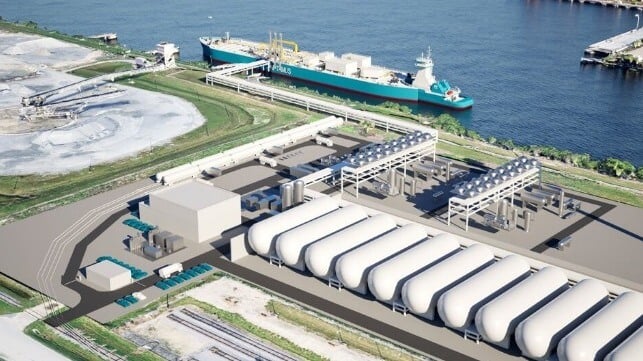Design Work Awarded for First U.S. LCO2 Terminal Serving Florida’s Emitters

A contract has been awarded for the front-end engineering and design of the first U.S. temporary storage and liquefaction processing terminals for captured CO2. Known as COAST20 (Carbon Ocean and Storage Transport 20), it is an ambitious project that would provide a solution for the transport and storage of carbon emissions captured from Florida’s industry and be the kickoff for an industry that is also emerging in Europe.
The project is being developed by Aptamus Carbon Solutions, a subsidiary of Overseas Shipholding Group, and has identified a 15-acre parcel with access to an existing deep-water berth in Port Tampa Bay for T-RICH (Tampa Regional Intermodal Carbon Hub) for the handling of the captured CO2.
It would be connected to a discharge and regassification terminal at LBC Tank Terminals, Baton Rouge, Louisiana. Transport of the CO2 would employ a 20,000-ton liquified CO2 tank vessel, which will be the first to be built in the U.S. The design calls for the first liquefied CO2 articulated tug-barge to be built in the U.S.
Aptamus has entered into an agreement with Entr, the consultancy arm of Aker Solutions, to conduct the front-end engineering and design for the COAST 20 project’s terminals. The concept for the Tampa Bay terminal calls for two 50 percent capacity liquefaction trains with a total throughput of 2 million tons per year and 30,000 cbm of LCO2 storage. The CO2 would be delivered to the facility from pipelines, rail, or truck, and exit on the LCO2 barge. The company’s website says the potential future throughput of the plant is as much as 8 million metric tons per year.
“We are excited to bring our pioneering expertise in designing and building CO 2 terminals, and other first-of-their-kind carbon removal projects around the globe, to Florida,” said Knut Egil Pedersen, Vice President of hydrogen and CO 2 at Aker Solutions.
The receiving terminal would be located on the Mississippi River near Baton Rouge, adjacent to an existing dedicated CO 2 pipeline system for delivery to permanent underground storage sites.
“Florida is the third highest CO2 emitting state in the nation,” explains Aptamus President, Jeffrey Ross Williams. “Entr’s development of the Port Tampa Bay hub and the LBC Tank Terminals site on the Mississippi River offers the ideal solution for managing captured CO2 in Florida, and we are delighted to partner with them for this critical project. COAST20 will also allow power generation companies to meet the increasing demand for electricity in Florida while managing their carbon output.”

that matters most
Get the latest maritime news delivered to your inbox daily.
COAST20 was selected in 2024 for an award to be partially funded by the U.S. Department of Energy and includes the design of the Port Tampa Bay intermodal hub site to collect captured CO2 from emitters across the state of Florida. Port Tampa Bay and LBC are also partners in the Aptamus COAST20 project.
The project is based on the determination that the Tampa Bay region is home to a high concentration of power-generating facilities and large industrial CO2 emitters. They believe that there are major operations that will become stranded emitters that require a solution for handling CO2 emissions. COAST20 is presented as a cost-effective solution.
